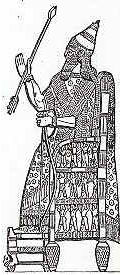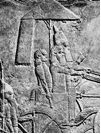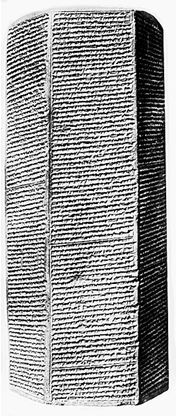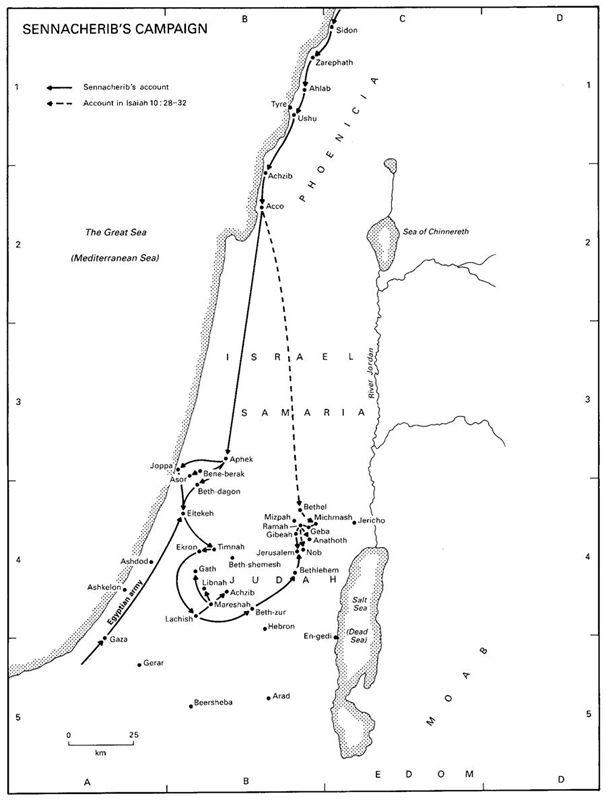Isaiah 36-37
 From
The Sennacherib Prism . . . . "In
my third campaign I marched against Hatti. Luli, king of Sidon,
whom the terror-inspiring glamor of my lordship had overwhelmed, fled far
overseas and perished.... As to Hezekiah, the Jew, he did not submit to my
yoke, I laid siege to his strong cities, walled forts, and countless small
villages, and conquered them by means of well-stamped earth-ramps and battering-rams
brought near the walls with an attack by foot soldiers, using mines, breeches
as well as trenches. I drove out 200,150 people, young and old, male and female,
horses, mules, donkeys, camels, big and small cattle beyond counting, and
considered them slaves. Himself I made a prisoner in Jerusalem, his royal residence,
like a bird in a cage. I surrounded him with earthwork in order to molest
those who were his city's gate. Thus I reduced his country, but I still increased
the tribute and the presents to me as overlord which I imposed upon him beyond
the former tribute, to be delivered annually. Hezekiah himself, did send me,
later, to Nineveh, my lordly city, together with 30 talents of gold, 800 talents
of silver, precious stones, antimony, large cuts of red stone, couches inlaid
with ivory, nimedu-chairs inlaid with ivory, elephant-hides, ebony-wood, boxwood
and all kinds of valuable treasures, his own daughters and concubines. . ."
From
The Sennacherib Prism . . . . "In
my third campaign I marched against Hatti. Luli, king of Sidon,
whom the terror-inspiring glamor of my lordship had overwhelmed, fled far
overseas and perished.... As to Hezekiah, the Jew, he did not submit to my
yoke, I laid siege to his strong cities, walled forts, and countless small
villages, and conquered them by means of well-stamped earth-ramps and battering-rams
brought near the walls with an attack by foot soldiers, using mines, breeches
as well as trenches. I drove out 200,150 people, young and old, male and female,
horses, mules, donkeys, camels, big and small cattle beyond counting, and
considered them slaves. Himself I made a prisoner in Jerusalem, his royal residence,
like a bird in a cage. I surrounded him with earthwork in order to molest
those who were his city's gate. Thus I reduced his country, but I still increased
the tribute and the presents to me as overlord which I imposed upon him beyond
the former tribute, to be delivered annually. Hezekiah himself, did send me,
later, to Nineveh, my lordly city, together with 30 talents of gold, 800 talents
of silver, precious stones, antimony, large cuts of red stone, couches inlaid
with ivory, nimedu-chairs inlaid with ivory, elephant-hides, ebony-wood, boxwood
and all kinds of valuable treasures, his own daughters and concubines. . ."
WHAT IF?
by Ross Prout
A fascinating new book
has come on the market entitled "What if?". Edited by Robert Cowley
and published by Pan Books, it is a compilation of articles, written by different
historians, concerning what might have happened if some of the great battles
of history had turned out differently. Often, the difference between victory
and defeat was some matter of chance, and the whole course of human history
would have been altered with an alternative outcome.
The battles are dealt
with chronologically, and the first one deals with the seige of Jerusalem
in 701BC by the Assyrian army under the ruler Sennacherib. The author of this
article is William H McNeill, and whilst it is clear that he prefers naturalistic
explanations to the biblical understanding of divine intervention, he nevertheless
handles the biblical text as a reliable source of historical information.
The battle/seige referred
to was certainly of great significance in the unfolding story of God's people.
The Northern Kingdom of Israel had already been utterly defeated. King Hezekiah
was on the throne of the Southern Kingdom of Judah, advised by the prophet
Isaiah. He had entered into a military alliance with the Egyptians, Phoenicians,
and Philistines against the great world power of the day, Assyria,
and it had been a debacle. Dozens of fortified cities had been defeated by
Sennacherib's army, and then Jerusalem
itself found itself under seige. When all seemed lost, the Assyrian army was
struck down by a mysterious pestilence, and Sennacherib withdrew his army.
What the disease was there is no way of knowing, but it meant that Judah was left
intact, and Hezekiah remained on his throne. Judah
remained a vassal state, yes, but the House of David stayed alive, and the
religion of Israel
survived. It is these two factors that McNeill sees as of greatest significance.
He says, "What if
Sennacherib, King of Assyria, had conquered Jerusalem in 701BC when he lead
his imperial army against a coalition of Egyptian, Phoenician, Philistine
and Jewish enemies, and handily defeated them all? This, it seems to me, is
the greatest might-have-been of all military history. This may be an odd thing
to say about an engagement that never took place; yet Jerusalem's preservation
from attack by Sennacherib's army shaped the subsequent history of the world
far more profoundly than any military action I know of."
This is a remarkable claim
coming from a secular historian. What does he base it on? He establishes that
without this reprieve, the state of Judah would have gone the way of Israel before
it, with the destruction not only of the nation, but also of their confidence
in God, as had happened in the north. As it was, the saving of Jerusalem
was seen as a special act of God's providence, and became the basis of a stronger
faith that even withstood the later exile in Babylon, 100 years later. As he said, "The
exiled people of Judah
did not pine away. Instead they flourished by the waters of Babylon,
and ... created an unambiguously monotheistic, congregational religion, independent
of place and emancipated from the rites of Solomon's destroyed temple in Jerusalem.
Moreover, the revised Jewish faith, tempered in exile, subsequently gave birth
to Christianity and Islam, the two most powerful religions of our age, and
of course retains its own, distinctive following around the world and especially
in the contemporary state of Israel.
"None of this would
have come to pass if the kingdom of Judah
had disappeared in 701BC ... Never before or since has so much depended on
so few, believing so wholly in their one true god, and in such bold defiance
of commonsense."
Out of the mouth of a
secular historian has come a tremendous statement regarding the purposes of
Almighty God. The world as we know it would certainly be entirely different
were it not for the preservation of Judah so long ago. May there be many
more of God's people today who 'defy commonsense' and trust in His providence.
- Ross Prout
Sennacherib: the Year - 701
The empire Sennacherib, son of Sargon, inherited was enormous: “The god
Assur has intrusted in me an unrivalled kingship . . . from the upper sea of
the setting sun to the lower sea of the rising sun, all mankind he has brought
in submission at my feet—and mighty kings feared my warfare, leaving their
abodes and fleeing. . . .” On climbing the throne, Sennacherib embarked on a
series of campaigns aimed at expanding it further still. He wrote of his
marching troops: “With the dust of their feet they covered the wide heavens
like a mighty storm with masses of dense clouds,” and he boasted: “The tents of
the steppe . . . I turned into a mass of flames . . . I swept like a hurricane.
I besieged, I captured, I destroyed, I devastated, I burned with fire.”
After two campaigns against his enemies in the north, and still early in his
reign, Sennacherib led his forces toward Syria
and Palestine.
The Assyrian army swept along the coast. It attacked Sidon and Luli, its king, fled into the sea
and perished. Sennacherib appointed a new king and received tribute from him.
Arvad and Ashdod, Ammon and Edom, brought
him gifts and “kissed [his] feet.”
Sennacherib encircled Beth-Dagon, Jaffa,
and Bne-Brak and conquered them. “The people of Ekron became afraid and called
upon the Egyptian king, the bowmen, chariots and horses of the king of Melukha
[Ethiopia],
a boundless host, and these came to their aid.” The Assyrian army met them at
Eltekeh, a small town on Palestine’s
Mediterranean coast. “In the plain of Eltkekeh (Al-ta-qu-u), their
battle lines were drawn up against me, and they sharpened their weapons.”
Sennacherib “fought with them and brought about their defeat. The Egyptian
charioteers and princes, together with the charioteers of the Ethiopian king my
hands took alive in the midst of battle.” the Egyptian-Ethiopian army was
defeated at the walls of Eltekeh; neighboring Ekron was stormed and its
inhabitants killed, their corpses hung on poles around the town.
“As to Hezekiah, the Judean (Ha-za-qi-(i)a-u Ia-u-da-ai), he did not
submit to my yoke.” Sennacherib besieged the “strong cities” of Judah and the
“walled forts” and “countless small villages in their vicinity,” and took them
by assault, sending the surviving population into exile: “200,150 people, young
and old, male and female.” Then he turned against the capital: “I made
(Hezekiah) a prisoner in Jerusalem,
his royal residence, like a bird in a cage.” Nevertheless, Jerusalem held out and Sennacherib withdrew,
though not before exacting a heavy ransom. “Hezekiah himself, whom the
terror-inspiring filendor of my lordship had overwhelmed . . . did send me,
later, to Nineveh, my lordly city, together with 30 talents of gold, 800
talents of silver, precious stones . . . couches (inlaid) with ivory . . .
elephants hides . . . and all kinds of valuable treasures, his own daughters,
concubines, male and female musicians. In order to deliver the tribute and to
do obeisance as a slave he sent his (personal) messenger.” Having agreed to the
ransom, Jerusalem
was not entered by the Assyrian army. The corresponding Biblical record in the
Second Book of Kings (18:14) differs only in the quantity of silver in the
ransom. It, too, mentions thirty talents of gold, but only three hundred
talents of silver.
Besides this record on a clay prism, Assyrian bas-reliefs show the siege of Lachish in southern Palestine,
on the way from Jerusalem to Egypt. From the
Biblical narrative (II Kings 18:14) we know that Sennacherib was at Lachish, pressing the
siege, when he received Hezekiah’s submission. Lachish
must have fallen not long afterwards; the reliefs depict the fall of th city
and a procession of its inhabitants being taken away to Assyria,
some on donkeys, some on foot, carrying their meagre possessions.
Did Sennacherib press further south toward Egypt? In the extant inscriptions
Sennacherib did not mention a specific campaign in Egypt
and Ethiopia.
Since early times the question has occupied the historians: Did Sennacherib
subdue Egypt,
or did he not?
Herodotos wrote that Sennacherib came against the land of Egypt
“with a great host” and encamped at Pelusium near its northeastern frontier.(1)
Berosus, who wrote a history of Chaldea, said that Sennacherib conducted an
expedition against “all Asia and Egypt.” (2) Jewish
tradition tells of the conquest of Egypt
by Sennacherib and of his march towards Ethiopia:
“Sennacherib was forced to stop his campaign against Hezekiah for a short time,
as he had to move hurriedly against Ethiopia. Having conquered this
‘pearl of all countries’ he returned to Judea.”
(3)
It appears that after the battle of Eltekeh in southern Palestine,
where he was victorious over the Ethiopian-Egyptian army, and having broken the
resistance of Hezekiah and reduced the fortified city of Lachish
on the approaches to Egypt,
Sennacherib crossed the border of Egypt proper and at Pelusium
received a declaration of submission.
Sennacherib
died January 681 BC,
Nineveh [now in Iraq]
 Sennacherib leading a military campaign, detail of a relief from Nineveh,
c. 690 BC; in … Reproduced
by courtesy of the trustees of the British
Museum
Sennacherib leading a military campaign, detail of a relief from Nineveh,
c. 690 BC; in … Reproduced
by courtesy of the trustees of the British
Museum
Sennacherib king of Assyria (705/704–681 BC), son of Sargon II. He
made Nineveh
his capital, building a new palace, extending and beautifying the city, and
erecting inner and outer city walls that still stand. Sennacherib figures
prominently in the O.T.
 Sennacherib’s
Prism is a hexagonal stone prism,
containing six paragraphs of cuneiform written Akkadian
Sennacherib’s
Prism is a hexagonal stone prism,
containing six paragraphs of cuneiform written Akkadian
|
|
DESCRIPTION
|
|
 Image source
Image source
Oriental Institute, Chicago
oi.uchicago.edu/OI
|
Language:
|
Akkadian
|
|
Medium:
|
Clay prism
|
|
Dimensions:
|
38cm high
13.3cm wide at the top
14cm wide at the bottom
the width of the six panels are:
8, 7.6, 7.52, 8, 7.3, 7.7cm
the hole at the top is 2.3cm
the hole at the bottom is 2.5cm
|
|
Length:
|
6 columns
500 lines of writing
|
|
Approximate Date:
|
689 BCE
|
|
Dates of Sennacherib's reign:
|
701–681 BCE
|
|
Purchaser:
|
J. H.
Breasted for
the Oriental Institute
|
|
Seller:
|
Baghdad
antiquities dealer
|
|
Date of Purchase:
|
winter 1919–20
|
|
Ostensible find location:
|
mound at Kuyunjik
(in modern Mosul, Iraq)
|
|
Current Location:
|
Oriental Institute
Chicago, Illinois
|
See
Sennacherib's Prism here
Detailed
Analysis
Sennacherib Sin (the god) sends many brothers, son of Sargon, whom he succeeded on the throne of Assyria (705
BC). His first act was to break up the powerful combination of princes who were
in league against him, among whom was Hezekiah, who had entered into an
alliance with
Egypt
.
Sennacherib accordingly led a very powerful army (reportedly 200,000 men in
size) into Judah, and devastated the land on every side, taking and destroying
many cities (2 Kings 18:13-16; compare Isaiah
22, 24, 29, and 2 Chronicles 32:1-8). His own account of this
invasion, as given in the Assyrian annals, is as follows:
Because Hezekiah, king of Judah, would not submit to my yoke, I came up
against him, and by force of arms and by the might of my power I took forty-six
of his strong fenced cities; and of the smaller towns which were scattered
about, I took and plundered a countless number. From these places I took and
carried off 200,156 persons, old and young, male and female, together with
horses and mules, asses and camels, oxen and sheep, a countless multitude; and
Hezekiah himself I shut up in Jerusalem, his capital city, like a bird in a
cage, building towers round the city to hem him in, and raising banks of earth
against the gates, so as to prevent escape...Then upon Hezekiah there fell the
fear of the power of my arms, and he sent out to me the chiefs and the elders
of Jerusalem with 30 talents of gold and 800 talents of silver, and divers
treasures, a rich and immense booty...All these things were brought to me at Nineveh, the
seat of my government."
(See Isa. 22:1-13
for a description of the feelings of the inhabitants of Jerusalem at such a crisis.)
Hezekiah was not disposed to
become an Assyrian vassal. He accordingly at once sought help from Egypt (2 Kings
18:20-24). Sennacherib, hearing of this, marched a second time into Palestine (2 Kings 18:17,
37; 19; 2 Chr. 32:9-23; Isa. 36:2-22. Isa. 37:25 should be rendered "dried
up all the Nile-arms of Matsor," i.e., of Egypt, so called from the
"Matsor" or great fortification across the isthmus of Suez, which
protected it from invasions from the east). Sennacherib sent envoys to try to
persuade Hezekiah to surrender, but in vain. He next sent a threatening letter
(2 Kings 19:10-14), which Hezekiah carried into the temple and spread before
the Lord. Isaiah again brought an encouraging message to the pious king (2
Kings 19:20-34). "In that night" the angel of the Lord went forth and
smote the camp of the Assyrians. In the morning, "behold, they were all
dead corpses." The Assyrian army was annihilated.
There is no mention of this great
disaster in the Assyrian annals.
Sennacherib did not campaign
again against Jerusalem
.
He was murdered by two of his own sons (Adrammelech
and Sharezer), and was succeeded by another son, Esarhaddon
(681 BC), after a reign of twenty-four years.
A SIEGE REMEMBERED BY MANY
This six-sided clay prism was written on behalf of Sennacherib, king of Assyria (704-681 B.C.). It contains the narratives of eight
of Sennacherib's military campaigns. He recounts in detail the manner in which
he defeated most of the major Near Eastern powers, including large coalitions
of Babylonians, Chaldeans, and Elamites. During his third campaign, Sennacherib
travelled to the West, attacked the Israelite king Hezekiah, and laid seige
to Jerusalem.
On this prism, Sennacherib boasts of complete victory over Hezekiah. However,
the story of this siege is also told in the Old Testament and, perhaps, by
Herodotus, the Greek historian. Both those sources claim that Sennacherib
retreated from the walls of the city after his forces succumbed to a plague.
THE STORY ACCORDING TO HERODOTUS
Book II. 141.
"...that night a multitude of fieldmice swarmed over the Assyrian camp
and devoured their quivers and their bows and the handles of their shilds
likewise, insomuch that they fled the next day unarmed and many fell."
THE STORY ACCORDING TO THE OLD TESTAMENT
II Kings 19:35-37
"And that night an angel of the lord went forth, slew a hundred and eighty-five
thousand in the camp of the Assyrians; and when the man arose early in the
morning, behold, these were all dead bodies. Then Sennacherib king of Assyria
departed and went home, and dwelt at Nineveh."
THE STORY ACCORDING TO THE SENNACHERIB PRISM
From A 2793, col iii 18-41
"As for Hezekiah, the Judean, who did not submit to my yoke, 46 of his
strong, fortified cities, as well as the small cities in their vicinity, which
were without number-I besieged and conquered... Himself, like a caged bird
I shut up in Jerusalem, his royal city...the
terrifying splendor of my majesty over came him, and he sent rich tribute
to me in Nineveh."

 From
The Sennacherib Prism . . . . "In
my third campaign I marched against Hatti. Luli, king of
From
The Sennacherib Prism . . . . "In
my third campaign I marched against Hatti. Luli, king of  Sennacherib leading a military campaign, detail of a relief from
Sennacherib leading a military campaign, detail of a relief from  Sennacherib’s
Prism is a hexagonal stone prism,
containing six paragraphs of cuneiform written Akkadian
Sennacherib’s
Prism is a hexagonal stone prism,
containing six paragraphs of cuneiform written Akkadian
 Image source
Image source